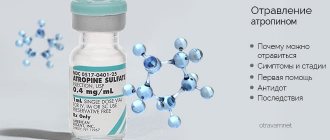Garlic is a plant loved by many. It is added to many dishes and eaten as a snack with soups and meat. It is believed to protect a person from viral infections, and consuming small amounts of it daily improves the immune system's defenses. But not many people know about the harm that this plant can cause to the human body. In this article, we looked at garlic poisoning, its causes, symptoms and treatment, and also tried to figure out who is strictly contraindicated from eating this plant.
4 more properties of this vegetable
Garlic contains a natural antibacterial substance - allicin.
It helps a person fight infectious diseases. Garlic also improves immune function, and doctors recommend it during seasonal flu epidemics to protect against the virus. Alcohol tinctures are made from garlic and are used to treat skin diseases. Due to the high risk of burns, they should be used with great caution, only after consultation with your doctor.
In addition to its positive effect on cardiovascular activity, garlic has the following effects on the body:
- this plant counteracts carcinogens, that is, the beginnings of cancer;
- has benefits for the digestive system, that is, it restores balance in the microflora and destroys harmful bacteria;
- affects the state of male potency, substances in the product help cope with dysfunction and promote erection;
- Allicin in the plant eliminates toothache if you apply a squeeze of it to the affected area in the mouth.
Causes of diarrhea from eating garlic
Some people who regularly use this product, including as an independent dish, complain of a change in their usual bowel habits. They often exhibit symptoms of diarrhea and also develop pain in the abdominal area.
It is noteworthy that none of the available components of the product systematically provokes diarrhea; moreover, in folk medicine and general practice it is used as an effective method of combating non-infectious diarrhea. Diarrhea from garlic can occur for several reasons:
- Individual intolerance to any of the components. People who are hypersensitive to certain natural compounds may experience individual intolerance to the product described above, including quite severe diarrhea.
- Eating a lot of foods. Any dish or food should be consumed in moderation. If you eat more than a couple of cloves of garlic every day, for example, several large heads, then this will definitely not benefit the body and can cause upset and a number of other problems with the gastrointestinal tract.
There are several ways to solve this problem. To begin with, try to significantly reduce the amount of product you consume, to a maximum of 1 or half a clove per day. If this does not help, then you will have to use alternative remedies that do not contain garlic or its essence.
How does garlic poisoning manifest?
Frequent consumption of garlic is well justified by its beneficial properties. It is a natural antibiotic that fights many viruses and antifungal cells that develop candidiasis.
Symptoms of garlic poisoning occur in different directions:
- in case of poisoning, vomiting begins;
- irritation of the mucous membrane occurs;
- high temperature rises;
- when poisoned, constantly vomits;
- lacrimation occurs;
- nasal congestion;
- skin rash;
- diarrhea;
- stomach ache.
In addition, garlic can cause dysfunction of the cardiovascular system if poisoned. In this case, the symptoms of garlic poisoning manifest themselves in pulse disturbances and blood clotting, and a sharp increase in blood pressure. When poisoned, the patient suffers from headaches and tachycardia. Pathology in the functioning of the coronary vessels can cause a heart attack.
Nausea, bloating, and weakness from garlic can begin due to an allergic reaction. If there is intolerance to the product, there is a risk of angioedema of the intestines and anaphylactic shock.
The product not only affects the digestive and nervous system. It may cause skin burns. The reason for this is poisoning with garlic essential oils applied to the epidermis.
Garlic poisoning clinically begins to manifest itself within the first two hours after eating this product. The digestive system reacts first, followed by symptoms from the cardiovascular and nervous systems.
Symptoms of garlic poisoning:
- pain in the stomach, heartburn, belching with an unpleasant garlic taste;
- a pronounced strong garlic odor from the patient’s mouth;
- slowly increasing nausea followed by vomiting. These symptoms are caused by severe irritation of the stomach lining;
- severe headache during poisoning, dizziness;
- general weakness;
- increase in body temperature to 37-37.5 degrees;
- rapid heartbeat (tachycardia). The pulse rate exceeds 100 beats/min. Arrhythmia, an abnormal heart rhythm, may also develop. A person may complain that he feels interruptions in the functioning of his heart;
- arterial hypertension, in which there is a sharp rise in blood pressure.
Spasm of blood vessels in the head: causes, how to relieve and treat?
Category: Food poisoning
Garlic poisoning is not that uncommon, which is why it is so important to know about the possible causes and symptoms of intoxication with this plant.
Everyone knows about the positive qualities of garlic: its daily use during the season of viral diseases increases the body's resistance to various diseases. However, despite all the benefits, the plant can cause harm to the body.
Benefits and harms
Garlic is used in cooking as a seasoning for many dishes. Also, many medicines are prepared from the plant at home, aimed at destroying viruses, bacteria and fungi.
Positive qualities of the product:
- Garlic has antiviral properties: it contains allicin, a substance that prevents viruses from entering the human body.
- The protein contained in the plant increases the body's resistance.
- The vegetable has a negative effect on staphylococcal infections and prevents the proliferation of many types of fungi on the surface of the skin.
- Eating garlic in small quantities daily will help lower cholesterol in the body.
- The vegetable is used in the treatment of cardiovascular diseases and prevents the formation of thrombosis.
- The plant product is excellently used as an antioxidant.
- Eating a clove of garlic will also help lower blood pressure and dilate blood vessels.
In addition to its positive qualities, garlic has negative properties in relation to the body.
Negative aspects of the product:
- People suffering from stomach ulcers, chronic kidney and liver diseases should avoid eating this healthy vegetable.
- Nasty smell.
- Garlic increases appetite, so people who are prone to obesity try to avoid it.
- In large quantities, the plant causes lethargy and memory problems.
- If you are diagnosed with epilepsy, garlic is strictly contraindicated; it can cause new attacks.
Thus, all the negative qualities of a vegetable are expressed only when it is consumed excessively.
Garlic poisoning begins to manifest itself 3 hours after eating it. First the stomach suffers, then the intestines and the cardiovascular system.
Causes and symptoms of poisoning:
- Essential oils found in excess in plant products have an irritating effect on the digestive organs. In this case, the person feels belching, nausea, and stomach pain. However, this phenomenon does not fall under the category of food poisoning.
- Garlic poisoning caused by improper storage of the product. The vegetable should be stored in a cool, dry place, out of reach of sunlight. Otherwise, pathogenic bacteria appear in it, causing poisoning in humans. The patient is worried about nausea, vomiting, diarrhea, flatulence. There is a strong smell of the plant in the urine.
- Allergic reaction to plant components. Allergies can manifest themselves in various ways: in the form of increased watery eyes, sneezing, and nasal congestion. When garlic juice comes into contact with the surface of the skin, various rashes may appear on the epidermis.
- Garlic intoxication, which affects the human cardiovascular system. Poisoning by the plant manifests itself in the form of tachycardia, an abnormal heart rhythm. Also, when abusing garlic, patients report severe headaches and low-grade body temperature.
- The components that make up the herbal product have a negative effect on the central nervous system. Poisoning manifests itself in the form of deterioration of the visual apparatus, absent-mindedness, and memory loss.
If we consider that plant poisoning affects different human organs, then the symptoms may differ from each other.
First aid for garlic poisoning is no different from the treatment of food intoxication.
Necessary actions:
- The patient should drink a large amount of warm liquid: a weak solution of potassium permanganate or soda. Then, by pressing on the root of the tongue, you need to induce vomiting.
- To remove toxins from the digestive system, doctors recommend taking any sorbent: activated carbon, Smecta or Enterosgel.
- To prevent dehydration, the victim must be given Regidron solution.
If after a few hours the patient’s condition has not improved, you should seek medical help.
Treatment in hospital:
- Gastric lavage through a special tube.
- Taking sorbents to remove harmful substances from the body.
- If the water-salt balance is disturbed, the patient is prescribed droppers with glucose or 9% sodium chloride solution.
- Laxatives are prescribed to cleanse the intestines of toxins.
- Enzymes are necessary to normalize the motility of the digestive system.
- The patient is prescribed medications that relieve inflammation of the stomach and eliminate heartburn.
- Vitamin therapy is designed to strengthen the body's defenses.
- It is mandatory to take medications that restore intestinal microflora.
The sooner you start treating intoxication, the faster the body will get rid of the symptoms of poisoning. Complex therapy necessarily includes a therapeutic diet. Many patients in the toxicology department are interested in whether it is possible to eat garlic if poisoned? After eliminating the signs of intoxication, patients are not recommended to eat plant products for a long time. Neglecting these rules can provoke inflammation of the gastrointestinal tract and other organs.
Despite all the beneficial properties of garlic, if consumed excessively, the vegetable can cause a number of serious complications.
Complications after plant poisoning:
- Intestinal disorder.
- Inflammation of the pancreas.
- Tachycardia, arrhythmia.
- Dysfunction of the cardiovascular system.
Avoiding garlic poisoning is very simple - just follow moderation when eating it, store it only in the refrigerator and buy it in trusted stores. If you follow these simple rules, the vegetable will only benefit the human body.
Vasospasm is a condition in which the lumen between the walls of blood vessels narrows. This occurs when the vascular walls contract intensely and for a long time. Spasm of cerebral vessels leads to disruption of blood flow and is characterized by the following symptoms:
- Headache;
- Dizziness with spots in the eyes;
- Tinnitus that worsens with physical activity;
- Nausea, vomiting;
- Impaired speech and spatial coordination, memory loss (in severe cases).
Headaches can be felt anywhere on the head. It can be triggered by stress or changes in weather. In the latter case, this occurs especially often in weather-dependent people. If you measure your blood pressure at this moment, you will find that it is high or low.
Previously, symptoms of cerebral vasospasm were observed mainly in older people, since the elasticity of blood vessels decreases with age. But lately this often happens to young people, especially in large cities. The reason for this situation is the general deterioration of the environment, when there are large amounts of toxic substances in the air and the amount of oxygen is decreasing.
Causes of the problem
The causes of cerebral vasospasm include the following:
- Overwork. When a person works too much while sitting at a computer, for example, the blood supply to the brain deteriorates and vasospasm occurs.
- Lack of sleep. The brain, like any other organ of the body, needs to rest. His fatigue due to lack of sleep is expressed, among other symptoms such as headache, also in the onset of vasospasm.
- Lack of oxygen. The nutrition of the brain deteriorates, to which the blood vessels react first. You need to spend more time in the fresh air and ventilate the room in which you spend most of your time.
- Smoking. In a person who smokes more than a pack of cigarettes per day, the likelihood of vascular spasms in the head increases many times over compared to a non-smoker.
- Various diseases and conditions:
- Vegetative-vascular dystonia (accompanied by noise and ringing in the ears, shortness of breath, a feeling of weakness in the heart, coldness in the extremities);
- Cardiac dysfunction (shortness of breath, tachycardia):
- Disorders of the thyroid gland;
- Renal dysfunction;
- A brain tumor;
- Osteochondrosis of the cervical spine (narrowing of the openings in the processes of the vertebrae through which arteries pass that supply blood to the brain).
In addition, the most ordinary everyday situations can provoke a spasm in the head, for example, when a person is in the cold for a long time with his head uncovered, if he has drunk more alcohol than he can afford; if you experienced short-term stress (for example, you had an argument with someone at home or at work).
Any strong emotion can cause a spasm - not only negative, but also positive. Indian yogis recommend generally abstaining from strong emotions, since they “shatter” all systems of the body. And the brain is no exception. So, if you want to avoid spasm of cerebral vessels, which is fraught with such a terrible disease as a stroke, try not to worry, especially over trifles.
Eye spasms
The eyes are also part of the brain. Spasm of the blood vessels of the eye, in particular in the retina, can cause visual impairment. For example, periods of blurred vision occur that last from a few minutes to an hour. If the spasm is prolonged, necrosis of the retina may occur, leading to complete blindness.
Narrowing of the fundus vessels can occur during exacerbation of vegetative-vascular dystonia. In this case, the ophthalmologist will diagnose “angiospasm”. If vasospasm is caused by atherosclerotic changes, sclerosis of the retinal arteries is detected in the fundus during ophthalmoscopy. When diagnosed with retinal angiopathy, a person may experience blood pulsation in the vessels of the fundus.
Cerebral vasospasm is a very serious condition. It must be treated by all possible means in order to avoid a stroke, the consequences of which are long and difficult to overcome. Treatment of cerebral vasospasm begins with an accurate diagnosis. To do this, the doctor will prescribe a collection of general tests, as well as an ultrasound of the brachiocephalic arteries (BCA) using Doppler and a magnetic resonance examination of the cervical spine. The size of the lumens in the vessels and the strength of blood flow are determined using angiography, i.e. X-ray of blood vessels with contrast agent.
Causes of garlic poisoning
- With increased acidity, this behavior of the stomach is quite typical (it can make you feel sick). He is simply trying to push out of himself those substances that can harm him.
- Garlic can irritate the walls of the stomach quite strongly, which can cause them to be corroded and then an ulcer will open.
- Just intolerance.
Can you get poisoned by garlic? Intoxication with it can develop for many reasons. This product should be consumed in limited and moderate quantities. It is believed that you can eat no more than 1-2 heads of garlic at a time.
The causes of garlic poisoning are listed below.
- Garlic overdose. Symptoms of poisoning may appear after eating 1 whole head of garlic.
- Use of tinctures or other homemade medicines prepared with garlic. Be extremely careful and do not engage in treatment using alternative medicine methods.
- Consumption of garlic by people for whom it is contraindicated. This product is prohibited if:
- acute or chronic gastritis;
- peptic ulcer;
- frequent heartburn;
- increased acidity of gastric juice;
- period of pregnancy and lactation;
- epilepsy;
- bronchial asthma;
- hepatitis, liver cirrhosis;
- acute or chronic liver failure;
- abnormal heart rhythm, arterial hypertension.
If after eating garlic you begin to notice stomach pain, heartburn, changes in blood pressure, or tachycardia, consult your doctor. You may not want to add this product to your food.
What is it characterized by?
Food poisoning caused by garlic appears gradually. This means that the symptoms of an intestinal disorder do not appear all at once, but appear one at a time and gradually get worse.
Indigestion begins with the occurrence of pain in the stomach area, with a return to the right hypochondrium. The sensation appears an hour and a half after eating a spoiled product. Over the next 30-60 minutes, the cutting pain is accompanied by other signs of intestinal disorder:
- nausea, either transforming into vomiting or not;
- headache, mainly concentrated in the occipital region;
- muscle weakness, general depression, dizziness;
- strong seething in the stomach, clearly felt “sounds”, flatulence;
- diarrhea.
People suffering from arrhythmia or other heart ailments, in addition to the characteristic symptoms, experience a jump in blood pressure.
Severe intoxications are characterized by:
- An increase in body temperature followed by a rapid decline.
- Increased sweating.
- Chills or fever.
In people prone to allergic reactions, skin rashes form during the first day of intoxication.
What to do in case of poisoning
In the case where the symptoms of poisoning are caused by excessive consumption of onion plants, it is necessary to provide prompt assistance to the victim of poisoning. The first step is to call a doctor or go to the nearest outpatient center. It is not recommended to treat poisoning on your own, since the work of the heart and stomach is involved. It is necessary to provide assistance before the arrival of doctors in case of poisoning. Product poisoning most often causes nausea and intestinal upset.
During attacks of nausea, you need to help clear your stomach. To do this, you need to provoke the vomiting process by sticking two fingers deep into your mouth. It is recommended to drink a saline solution. Take 1 tbsp. a spoonful of salt and stir in one liter of warm water.
A weak manganese solution is suitable. Potassium permanganate should turn the water slightly pink so that the esophagus and mucous membrane of the larynx do not get burned.
Take activated charcoal to reduce toxins in your stomach. The absorbent is drunk at the rate of 1 tablet per 10 kg of body weight. You should drink plenty of water at room temperature. If you do not drink a lot of water, charcoal can cause intestinal obstruction and constipation.
If diarrhea begins from garlic, an important step in providing assistance is rehydration therapy. It is necessary to replenish the body with fluid; for this it is recommended to drink a lot of fluid, since dehydration leads to a coma.
A number of activities need to be carried out:
- take Smecta, Enterol or another sorbent to treat an upset stomach;
- Follow a diet for the next few days, it is advisable to give up food for a while;
- drink strong herbal teas;
- conduct cleansing enemas with medicinal plants;
- take medications that have binding properties;
- Taking plant fiber and fructo-oligosaccharides will help bring intestinal activity back to normal.
Diarrhea can disrupt the functioning of the pancreas. Therefore, it is recommended to use enzyme preparations that can restore its function. They reduce heaviness in the stomach and eliminate flatulence. The most popular means include:
- Pancreatin;
- Panzinorm forte;
- Pangrol;
- Mezim forte;
- Hermital;
- Festal;
- Unienzyme.
It is necessary to follow a strict diet, avoiding fried and dairy products. You cannot drink alcohol or coffee.
Why diarrhea
Here are the main reasons:
- Maybe it’s just the garlic; maybe it’s an individual reaction. As a rule, garlic does not cause diarrhea.
- Most likely, you may be using it in a specific dish that makes you upset.
Garlic has another dangerous property - strength, which negatively affects the stomach. People who suffer from gastrointestinal diseases should avoid this product.
Usually it even helps with diarrhea.
Side effects of garlic abuse
Indian Ayurvedic medicine categorically does not recommend consuming garlic. The product is considered the most toxic plant. Even though it is a powerful antibacterial agent, there are a number of scientifically proven negative side effects.
Allergists have encountered cases where the body suddenly stops accepting garlic as a healthy product and a reverse immune reaction occurs. Histamine is triggered to fight aggressive allergens, which leads to an allergic effect:
- runny nose;
- lacrimation;
- sneezing.
The most dangerous sign is swelling of the airways, which often leads to suffocation.
Toxicity manifests itself in the fact that the hydroxyl ions included in the product invade the blood-brain barrier, which is a barrier between capillary blood and neurons of the central nervous system. There is a disruption in brain waves and the person becomes inhibited, problems with thinking and memory appear.
Abuse of hot vegetables can cause botulism. This is the most terrible negative effect. Severe toxic infectious disease most often occurs when the product is not stored correctly.
You should not eat garlic before a planned operation. It worsens bleeding and affects blood pressure. Antiplatelet properties pose a threat to bleeding in patients taking blood thinning medications.
Excessive intake of garlic causes a burn in the gastrointestinal system. The spicy vegetable burns the intestinal mucosa and damages the lining and the organ itself. As a result, a through hole may appear.
Pregnant women are not recommended to abuse this burning product. Normally, it is considered enough to eat 1-2 cloves of garlic. An excessive dose can increase the tone of the uterus, which is dangerous during pregnancy. But drinking a large volume of liquid leads to swelling in expectant mothers. Doctors strongly advise against adding garlic to food during breastfeeding.
People who have the following diseases should avoid taking the spicy plant:
- stomach or duodenal ulcer;
- inflammatory disease of the wall of the esophagus, acute or chronic;
- epilepsy;
- kidney diseases;
- hypertonic disease;
- gastritis.
Excessive consumption of vegetables can cause feelings of aggression, anxiety, and agitation.
Abuse of garlic leads to negative changes in the body. It disrupts digestion, heart and intestinal function. Treatment for poisoning takes place at home under the supervision of a doctor. During treatment, you need to follow a diet, drink a lot of water and take medications prescribed by a specialist.
Prevention
To avoid garlic poisoning, you must adhere to the following recommendations:
- You need to store the vegetable in a cool place;
- When purchasing, pay attention to ensure that there are no traces of mold or black spots on the surface of the husk;
- observe moderation when preparing main courses and salads;
- Avoid buying in spontaneous markets.
Excessive addition of this vegetable to food will not increase its beneficial qualities, and does not increase the nutritional value of dishes prepared with it, but an overdose of garlic is possible. Therefore, the principle of moderation will avoid garlic poisoning. This is especially true for those people who have chronic pathologies with impaired functionality of the stomach and intestines.
How possible is garlic poisoning? What are the symptoms, what to do? Such questions, like many others, invariably arise during intoxication caused by this vegetable. People are absolutely convinced that garlic is dangerous only for vampires, ghouls, ghouls and other fairy-tale bloodsuckers, but an ordinary person cannot be poisoned by it.
This confidence is based on the specific use of this product. Garlic is added to homemade preparations not only for taste, but also to ensure the safety of the contents. The vegetable is used as a preventative and therapeutic remedy for colds. That is, garlic has the reputation of a product that is medicinal, health-improving, and incapable of spoiling, much less causing digestive upset.
First aid for poisoning
You should not try to cure a patient with garlic poisoning on your own. As we already wrote above, this condition can be accompanied by disruption of the heart and severe irritation of the stomach, so it is dangerous to take risks and treat the poisoned person at home on your own.
When the first symptoms of poisoning appear, call an ambulance or go to the nearest medical facility (outpatient clinic, hospital, clinic).
What to do before the doctors arrive? You can help the patient yourself by doing the following:
- If no more than 4 hours have passed since consuming garlic, you need to drink several glasses of plain water in one gulp and induce vomiting.
- Give the patient sorbents, for example, activated carbon or atoxyl.
- Give the patient some warm sweet tea or plain water.
What is the treatment?
Treatment of such poisoning is carried out traditionally. At the first signs of ill health, you need to help the victim clear the stomach of food debris. The gastric lavage procedure is necessary only if no more than a couple of hours have passed since consuming a dish with spoiled garlic. If a person is poisoned by a pickled vegetable, then this period is reduced by 20-30 minutes.
After the victim’s stomach is free of food debris, it is necessary to help the patient take sorbents. Considering the specifics of poisoning, the best option would be black activated carbon. People who have vomited usually have difficulty swallowing tablets whole. For this reason, the washers need to be crushed and mixed with warm water.
The body's recovery process takes from a couple of days to a week. The duration depends on the severity of the poisoning, the general health of the person and his age. Throughout the entire treatment period, you must continue to use sorbents.
As a rule, no other medications are required. However, if the victim has chronic diseases of the digestive organs, he may be tormented by pain. In such a situation, it is advisable to take the following medications:
As for means that stop diarrhea, there is no need to use them unless necessary. The specificity of this intoxication is the penetration of bacteria and fungal infectious agents into the intestines. By using medications that have a strengthening effect, a person prevents their natural removal from the intestines.
The healing process is accelerated by teas and infusions from medicinal plants. You can purchase the necessary preparations at any pharmacy. And fennel or chamomile teas are available in every hypermarket.
An important element of treatment is compliance with dietary restrictions. Of course, it is not recommended to eat garlic if you are poisoned, but in addition to it, you should not eat fried, salted, spicy, pickled, or fatty foods. Spices, sauces, alcoholic and carbonated drinks are completely prohibited. The patient needs light, fully digestible and dietary food.
Video: what will happen if you eat garlic every day?










